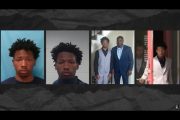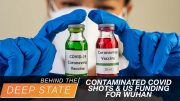
In an early-morning tweet, President Donald Trump decried the violence in Chicago and announced that he was sending in “federal help.” But the rationale for this “help” would not exist if Chicago police were not hamstrung by the war on cops and the “Ferguson Effect.”
President Donald Trump’s early morning Tweet on Friday decried the continuing violence in Chicago and announced that he was sending in “federal help.” Tweeted the president: “Crime and killings in Chicago have reached such epidemic proportions that I am sending in Federal help. 1714 shootings in Chicago this year!”
As of Sunday June 25 there were 308 murders in Chicago as compared to 311 at the same time last year. President Trump disparaged the continuing violence in Chicago during his campaign and then following his inauguration, calling it “horrible carnage” and “out of control” and threatening to “send in the feds” without defining exactly that he meant.
With the creation of the “Chicago Crime Gun Strike Force” (unfortunately linking crime with guns in the public’s perception) observers are learning more about what he meant: It will involve a “closer” working relationship between the Chicago Police Department (CPD), state troopers, federal ATF agents, and Department of Justice (DOJ) prosecutors. It will also involve more federal money and technology to build out “tech-based nerve centers” that can track the location of gunshots and then tie them to known criminals and gangs. There will be another 20 federal ATF agents involved as well, completing the plan that Chicago ATF Special-Agent-in-Charge Celinez Nunez recommended during conversations with DOJ officials earlier this year.
Nunez’s recommendation was based upon her prior experience in working with the locals while special agent in charge of the Seattle Field Division. She created and operated the “Puget Sound Regional Crime Gun Task Force” which, according to her bio, was successful in linking gun violence with known criminals while expanding efforts to reopen “dead end” cases.
Chicago PD officials say that her new “strike force” will be a “specialized team of city cops, federal agents and Illinois state troopers” who will work “exclusively” on gun violence that has plagued the city for the last two years.
However, the federal “rescuers,” and local authorities who want the feds to come to the rescue, are overlooking a crucial, documentable fact: The crime wave in Chicago is being exxaberated by a war on police in general and the “Ferguson Effect” in general. And this tragic, and avoidable, increase in crime is being used as a rationale for the federal intervention.
Heather Mac Donald exposed the “Ferguson Effect” and its consequences in her book The War on Cops: How the New Attack on Law and Order Makes Everyone Less Safe. First coined by Sam Dotson, chief of the St. Louis Police Department in 2014, the term describes the increasing reluctance of officers on the beat to confront criminals owing to fears that they might be charged themselves with criminal activity. In an article appearing in the Wall Street Journal in May of 2015, Mac Donald noted that, thanks to the “Ferguson Effect” — named for Ferguson, Mo., where the 2014 police shooting of Michael Brown took place — “cops are disengaging from discretionary enforcement activity and the ‘criminal element is feeling empowered,’ Mr. Dotson reported.”
In another article appearing in the Journal, on September 11, 2016, Mac Donald noted that “Chicago officers have cut back drastically on proactive policing under the onslaught of criticism from the Black Lives Matter movement and its political and media enablers.” As a result, she wrote, “criminals are back in control and black lives are being lost at a rate not seen for decades.” But not surprisingly, the cause-and-effect relationship between the hamstringing of local police and runaway crime was not included in the public announcements concerning the Chicago Crime Gun Strike Force.
What is obvious to even the most casual observer is the dangerous presence of federal agents, federal aid, and federal technology all coordinated by a federal ATF agent skilled in such matters in “helping” the CPD restore order. What is less obvious is the difficulty of applying common sense to the liberal anti-gun and anti-police establishment that rules Chicago. James Fitzgerald, head of the Support Your Local Committees sponsored by The John Birch Society in its efforts to inform and educate, made the point clear in a conversation with this writer. Said Fitzgerald,
It doesn’t matter what the Trump administration says about wanting to help Chicago; much of the crime problem in Chicago can be attributed to the present attitude that police must not be allowed to perform their duties properly without worrying about being sanctioned, punished, attacked, smeared or fired as a result.
If the police were simply allowed to do their job, said Fitzgerald, there wouldn’t be a need for so-called federal “help.” After all, it wasn’t until the ACLU’s intervention that Chicago crime began to soar. According to the Chicago Tribune, the city’s violent crime rate is currently more than 40 percent higher that it was in 2015.
Photo of Chicago police officers: AP Images
An Ivy League graduate and former investment advisor, Bob is a regular contributor to The New American magazine and blogs frequently at LightFromTheRight.com, primarily on economics and politics. He can be reached at [email protected].
Related article:




